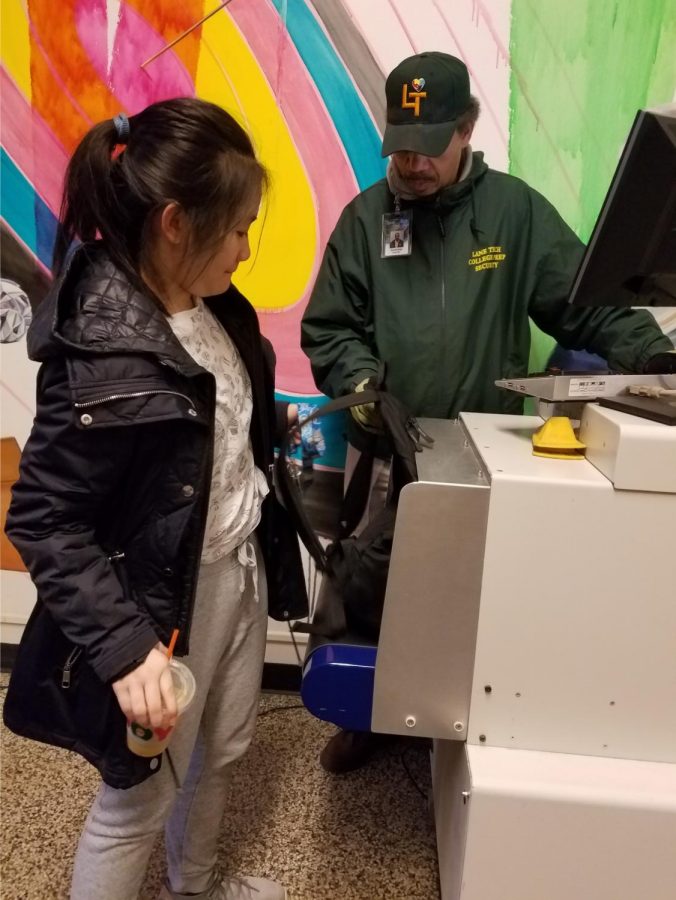Pepper spray: Protection for traveling students or a safety issue?
It is well after four o’clock and the sun has begun to set. Patricia McDonnell walks anxiously in the dark, her eyes scanning over every possible corner, checking for human-shaped shadows. Her hand clenches the pepper spray in her pocket, prepared to pull it out if any of those shadows were to materialize.
This is a situation many women, particularly young women, can relate to. Crime rates have been at an all-time low since their height in 1990, when the crime rate was 800 for every 1,000 Americans, according to a report done by the Federation of American Scientists in 2018.
Despite this, almost half of women reported feeling unsafe walking alone at night according to a survey given by Gallup in 2014.
There are plenty of reasons for women to fear moon-lit streets. According to RAINN (The Rape, Abuse and Incest National Network), one in six American women will be victims of rape in their lifetime. Additionally, girls between the ages of 16 and 19 are four times more likely to be rape victims than the general population.
Students who feel unsafe traveling to and from school may choose to carry items for their protection, such as pepper spray.
McDonnell, Div. 081, has a 40 to 60 minute commute to and from school. While taking public transportation or walking home alone, McDonnell said she often feels unsafe and scared. She typically carries pepper spray to protect herself against potential danger.
“I feel the need to carry spray with me just in case something were to happen to me, then at least I’d have a chance to defend myself.
While McDonnell feels carrying pepper spray helps lessen the possibility of facing danger, there is ample worry from administration about the dangers carrying pepper spray can cause for students while in school.
When she was a freshman, McDonnell had her pepper spray confiscated by security.
“Leaving school that day, it was already dark after my practice and I was so scared to go home all by myself,” McDonnell said. “So I waited an extra 30 minutes until a friend of mine got out of her practice, so I didn’t have to go home alone.”
Lane’s policy bans pepper spray and administration often confiscates it from students. Many students, however, feel they should be allowed to carry these items for protection.
This begs the question: Is there a proper middle ground between on-campus and off-campus safety?
The dean of underclassmen students, Mr. Lopez, said there might be.
Lopez has been dean for two years and says he tries his best to help the students that are sent to him. Confiscated items, like pepper spray, often wind up at his desk.
“Sometimes we have to look at things and evaluate: is this dangerous to have in the building?” Lopez said. “In some cases, if it is dangerous, I’ll keep it from them.”
Students are welcome to retrieve their confiscated items after school, Lopez said.
“When they remember, then they can come get it, and I’m absolutely fine with it,” Lopez said. “During the school day, I’m hoping they don’t need it.”
Assistant Principal Ms. Hanly understands why students may feel the need to carry pepper spray, but feels there are alternatives.
“I believe in being mindful and trying not to put ourselves in situations where we might be in danger,” Hanly said.
Students who simply cannot avoid danger deserve to feel safe as well, and pepper spray might offer a sense of relief, says Hanly.
“Students from Lane travel from all over the city and you hear too many news stories about students, like you and me, not making it home from school safely. It’s absolutely horrifying,” McDonnell said.
Your donations directly fund the Lane Tech student journalism program—covering essential costs like website hosting and technology not supported by our school or district. Your generosity empowers our student reporters to investigate, write, and publish impactful stories that matter to our school community.
This website is more than a publishing platform—it's an archive, a research tool, and a source of truth. Every dollar helps us preserve and grow this resource so future students can learn from and build on the work being done today.
Thank you for supporting the next generation of journalists at Lane Tech College Prep!

Monika Meyers is a senior at Lane. This is the second year she has taken Journalism and is a Features editor for The Warrior. She enjoys reading, hanging...




